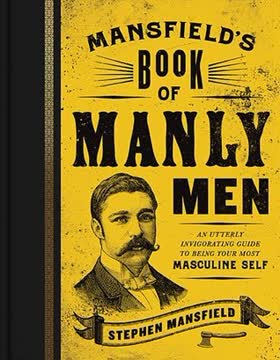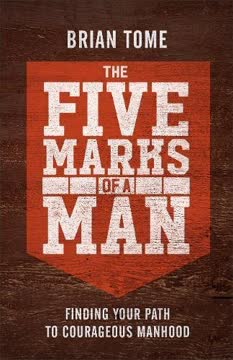Key Takeaways
1. Men have a long-term vision and break through barriers.
Boys live only for today. They wait for inspiration to strike or for someone to hand them their big break or for the perfect woman to walk through the door.
Vision defines purpose. A true man possesses a clear, long-term vision that extends beyond immediate gratification. Unlike boys who are shortsighted and drift, men define something bigger than themselves and relentlessly work towards it. This vision isn't about self-glorification but about making a significant, lasting impact, often seemingly beyond current capabilities.
Overcoming resistance is key. Pursuing a big vision inevitably invites resistance, criticism, and suffering. Boys look for open doors and the path of least resistance, but men understand that everything significant comes through struggle and persistence. They don't view conflict as a sign to quit, but as an opportunity for growth, knowing that "suffering produces perseverance; perseverance, character; and character, hope."
Action fuels vision. The journey from boyhood to manhood is marked by a shift from passive waiting to active focus. Men make hard choices, saying "no" to distractions that don't align with their long-term goals. They understand that ideas are only 5% of the formula; the real work is in relentlessly pursuing and breaking through barriers to turn that vision into reality.
2. Men stand against the tide and embrace integrity.
The moments that define us as men are when we choose to do something that’s difficult that we know won’t be a popular choice.
Courage to stand out. Boys crave fitting in and going with the flow, often conforming to cultural norms that promote superficiality or moral compromise. Men, however, are willing to take a minority position, standing against the tide when necessary. This isn't about being contrarian for its own sake, but about adhering to a deeper code of honor, even if it means being unpopular or facing criticism.
Integrity is wholeness. To be a man of integrity means being whole and consistent in all situations, not fractured by different standards for different contexts. Boys justify their lack of integrity by prioritizing immediate gain or comfort, but men understand that small, daily compromises erode their character. True integrity means being willing to "lose" in the short term for the sake of honor and truth.
Small choices build character. Integrity isn't reserved for grand, life-or-death moments; it's forged in the daily, seemingly trivial choices. Like weeds eroding a foundation, small compromises accumulate over time, leading to significant problems. Men recognize that their character is built through consistent adherence to their word, even when no one is watching, proving themselves trustworthy in the little things to be trusted with much.
3. Men embrace interdependence and respect authority.
Interdependence is when we stand on our own two feet but make ourselves open to relationships.
Strength in connection. The myth of the "lone wolf" is destructive; true men understand that thriving requires interdependence. God designed humanity for connection, mirroring the triune nature of Father, Son, and Holy Spirit. Men stand strong individually but are open to deep, supportive relationships, recognizing that isolation leads to weakness and spiritual death.
Authority fosters growth. Boys reject authority, often leading to chaos and stagnation. Men, however, respect and submit to authority, whether formal (like a boss) or informal (like a mentor or trusted friend). They understand that even imperfect authority figures can provide invaluable lessons and guidance, helping them grow stronger and more capable.
Truth-tellers are vital. Men actively seek out friends and mentors who will speak hard truths, even when it's uncomfortable. This "friendship authority" allows for honest feedback, helping men identify blind spots and avoid self-deception. They value "wounds from a friend" over "kisses from an enemy," knowing that genuine challenge is essential for personal and collective improvement.
4. Men are active team players who build each other up.
You will not find the warrior, the poet, the philosopher, or the Christian by staring in his eyes as if he were your mistress: better fight beside him, read with him, argue with him, pray with him.
Friendship through action. Male friendships are best forged through shared activity and common interests, not just passive conversation. Whether it's battling on the sports field, tackling a challenging project, or embarking on an adventure, men bond deeply when actively engaged in a mission together. This shared experience creates a "foxhole" camaraderie that builds trust and loyalty.
Mutual sharpening. Boys often engage in competitive or tearing-down behavior, fearing that another's strength diminishes their own. Men, conversely, operate on the principle of "iron sharpening iron," actively seeking to make each other better. They give friends a "hunting license" to call out weaknesses and blind spots, understanding that constructive challenge is essential for growth.
Encouragement fuels potential. True men build each other up through genuine affirmation and encouragement. This isn't empty flattery, but a "predictive affirmation" that calls out the best in a man, even if he hasn't fully achieved it yet. Encouragement provides the "protein for a boy's growth" and continues to be vital for men, stimulating the brain's ability to change and fostering resilience.
5. Men understand the power of play for vitality.
Play is the gateway to vitality. By its nature it is uniquely and intrinsically rewarding.
Play as replenishment. Contrary to the belief that play is only for boys, men understand it as essential for sustained vitality. Play is renewable energy for the heart, mind, and soul, acting as an antidote to stress and a catalyst for optimism, perseverance, and adaptability. Neglecting play leads to rigidity, depression, and a loss of emotional nimbleness.
Humility in recreation. God instituted rest and play from the very beginning, even before work, to remind humanity that they are "human beings, not human doings." Engaging in non-productive activity sends a healthy message to God: "I know who's in control of the universe, and it's not me." This Sabbath principle is crucial for spiritual sanity and physical health, restoring and renewing a man's energy.
Healthy pleasure prevents unhealthy desires. Men are wired for pleasure, and if they don't find it in healthy, planned ways, they will seek it in unhealthy, spontaneous ones. Regular, wholesome play acts as a "vaccine" against addictions, affairs, and other self-inflicted diseases. God "richly provides us with everything to enjoy," and a man pleases God by fully experiencing and enjoying the life he has been blessed with.
6. Men work to produce value and experience God.
Work makes things happen. Work improves reality. Work begets innovation that solves problems. Work shapes our character. Work makes us like God.
Work is inherently good. Boys don't want to work, viewing it as a necessary evil or a means to early retirement. Men, however, recognize work as an inherently good, God-given calling that predates sin. It's a means to create order, bring culture into being, and produce value. Every job, from paperboy to CEO, offers opportunities to develop character traits like consistency, endurance, and diligence.
Identity beyond occupation. While work is central to a man's life, his identity is not solely derived from his job title or paycheck. Boys often tie their self-worth to external achievements, leading to despair when jobs are lost or comparisons are made. Men understand they are "God's workmanship," finding their ultimate value in their relationship with Him, which frees them to approach work as an opportunity to contribute their best.
Serving others through labor. Men approach work with a servant mindset, understanding that their labor is ultimately about blessing others. Whether a plumber solving problems or a leader guiding a team, a man's work should be driven by a desire to serve, not just self-gain. This commitment to serving others through their vocation aligns with Jesus's example and ensures that their efforts contribute to something greater than themselves.
7. Men are protectors in all aspects of life.
Physically, sexually, intellectually, financially, and spiritually, men are protectors.
The core calling to protect. Men are uniquely wired to be protectors, a calling evident in their physical strength and spiritual DNA. This extends beyond physical defense to safeguarding others in every dimension of life. Unlike boys who are predators, taking what they want regardless of harm, men use their strength and resources to shield the vulnerable and ensure the well-being of those around them.
Comprehensive protection. This protective instinct manifests in various ways:
- Physical: Standing between danger and family, like John Rankin and John Parker protecting slaves.
- Sexual: Prioritizing a woman's future well-being over immediate pleasure, setting boundaries, and entering marriage with integrity.
- Intellectual: Continuously learning and sharing wisdom, protecting others from ignorance or bad decisions, and seeking advice from those ahead.
- Financial: Achieving financial health not for self-indulgence, but to provide for family and to give generously to those in need.
- Spiritual: Proactively leading others to "grace and truth," engaging in respectful spiritual conversations, and praying for those who need God's transforming power.
A lifelong commitment. Protection is not a one-time act but a continuous posture. Men don't "coast" after achieving milestones; they keep pushing themselves to grow and learn, recognizing that stagnation leads to vulnerability. By embracing this multifaceted role, men fulfill their divine design, leaving a legacy of strength, healing, and love for future generations.
Last updated:
Review Summary
The Five Marks of a Man receives generally positive reviews, with readers praising its practical advice on biblical manhood. Many find it thought-provoking and challenging, appreciating the contrast between boyish and manly behaviors. Some criticize its reliance on Christian themes and occasional stereotyping. The book's five marks—vision, minority stance, teamwork, work ethic, and protection—resonate with most readers. While some find it transformative, others note inconsistencies and question its approach to certain topics. Overall, it's recommended for men seeking guidance on faith-based masculinity.
Similar Books










Download PDF
Download EPUB
.epub digital book format is ideal for reading ebooks on phones, tablets, and e-readers.





